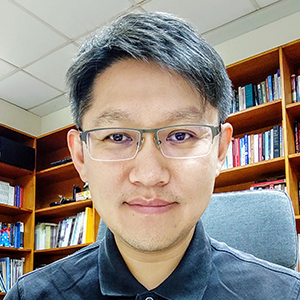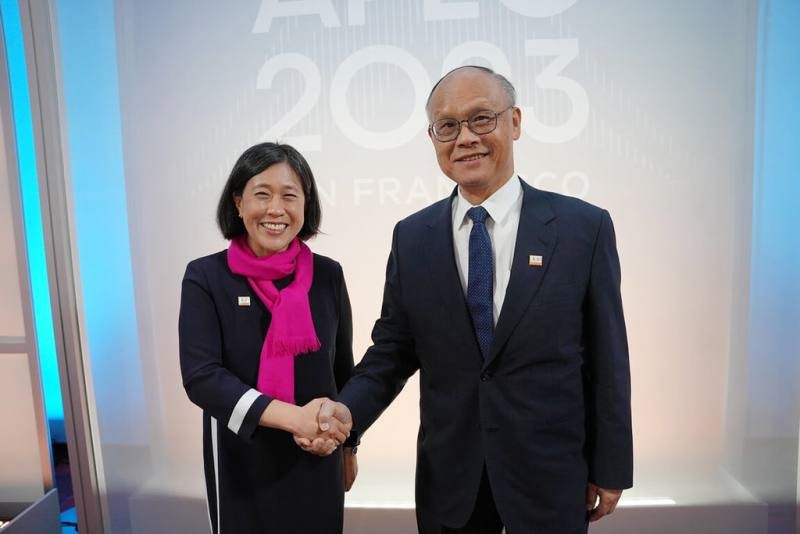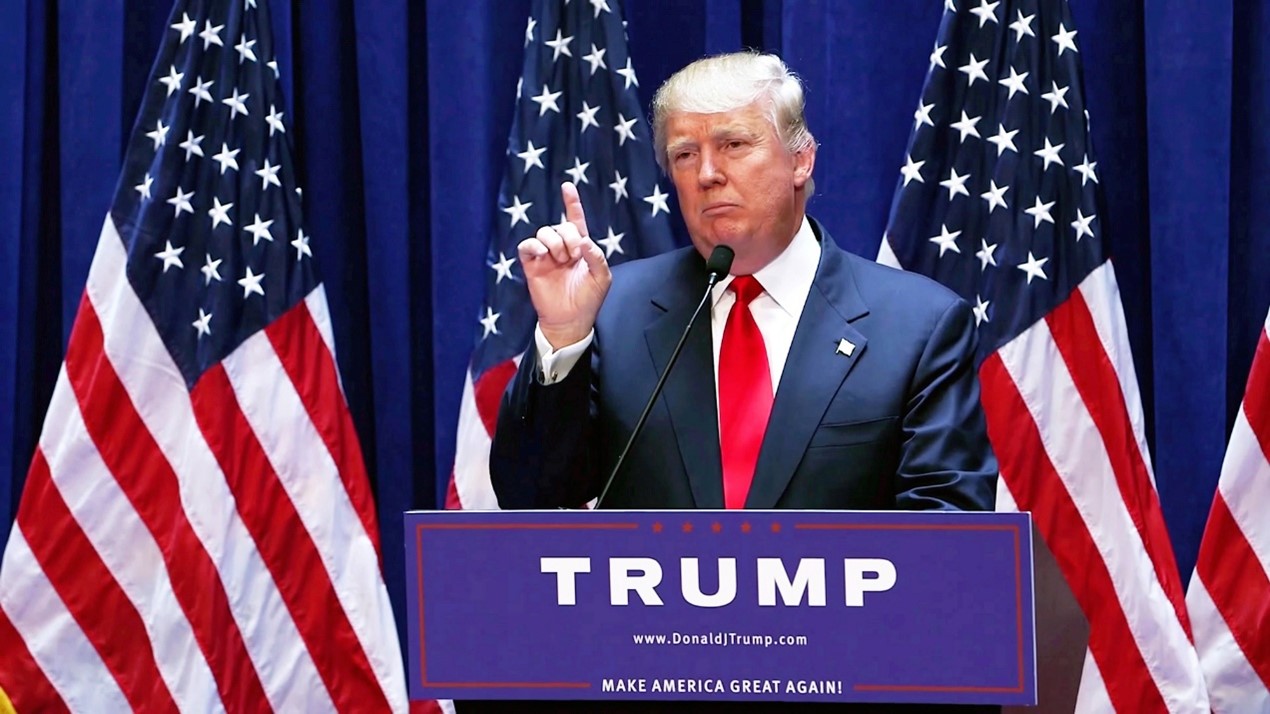The 2023 Asia-Pacific Economic Cooperation (APEC) annual meeting was held in San Francisco last month. The Taiwan delegation, headed by Minister of the National Development Council Kung Ming-hsin (龔明鑫) and John Deng (鄧振中), Minister Without Portfolio of the Office of Trade Negotiations of the Executive Yuan, played an active role in the APEC Ministerial Meeting.
Picture source: Taiwan, OCAC, November 16, 2023, https://www.ocac.gov.tw/OCAC/SubSites/Pages/Detail.aspx?site=3117a715-f7a7-4821-ba75-ab93badf8d20&nodeid=1109&pid=59154606.
Prospects & Perspectives No. 65
Securitizing Free and Open Trade Between Taiwan and the United States
By Ian Tsung-yen Chen
The 2023 Asia-Pacific Economic Cooperation (APEC) annual meeting was held in San Francisco last month. The Taiwan delegation, headed by Minister of the National Development Council Kung Ming-hsin (龔明鑫) and John Deng (鄧振中), Minister Without Portfolio of the Office of Trade Negotiations of the Executive Yuan, played an active role in the APEC Ministerial Meeting (AMM). Throughout their participation, they highlighted Taiwan’s invaluable experiences and the present challenges in digital transformation and the green transition. Their advocacy urged member economies to bolster collaboration, aiming for an open, dynamic, resilient, and peaceful APEC region. Another paramount goal was to garner support from CPTPP members for Taiwan’s inclusion in the trade agreement.
In tandem with participation in multilateral platforms, Taiwan’s delegates engaged in bilateral sessions with their U.S. counterparts. On Nov. 14, both Taiwanese representatives met with Under Secretary of State Jose W. Fernandez. Additionally, Deng and Hsiao Bi-khim (蕭美琴), Taiwan’s representative to the U.S., conducted bilateral dialogues with U.S. Trade Representative Katherine Tai. Media releases highlighted that these exchanges spanned a wide array of topics, encompassing the expansion of economic ties between Taiwan and the U.S. and exploring collaborative ventures in third-party countries. The discussions also centered on promoting cooperation in digital healthcare and addressing crucial bilateral trade matters that significantly influence the Taiwan-U.S. relationship.
Trade Disputes Have Minimal Impact on Taiwan-U.S. Relations
Presently, numerous economic disputes have hindered trade between Taiwan and the U.S. The 2023 National Trade Estimate Report on Foreign Trade Barriers, published by the United States Trade Representative, underscores Washington’s apprehensions concerning Taiwan’s tariffs and taxes on various agricultural products, including rice, peanuts, bananas, pineapples, and alcoholic beverages such as rice wine. Despite being relatively lower compared to other countries, these barriers have attracted considerable attention from Washington.
In addition to tariff obstacles, the U.S. remains displeased with Taiwan’s implementation of country-of-origin labeling requirements for specific pork products. This discrepancy raises concerns about potential conflicts with the WTO’s non-discrimination principle. Although Taiwan effectively resolved a contentious political dispute by lifting the import ban on U.S. pork containing ractopamine in January 2021, Washington has persistently challenged Taiwan’s labeling policies. This issue has been brought to the Taiwanese government and pursued through channels such as the WTO. Beyond the realm of merchandise trade, the U.S. maintains a close collaborative effort with the Taiwan government to address concerns regarding barriers in service sectors and foreign investments.
While numerous trade disputes persist, they largely constitute low-politics disagreements that are unlikely to have a substantial impact on Taiwan’s trade relations with the U.S. This is particularly evident in the challenges faced by the Taiwanese government, led by President Tsai, in lifting the import ban on U.S. pork containing ractopamine in 2021. This decision carried more than just economic implications for Washington. Amid the U.S. pork trade dispute, the Tsai administration positioned its policy as a strategic move to align with Washington amid escalating cross-Strait relations. Taiwan’s approval signaled a commitment to stand economically and strategically alongside the U.S. This concession in low-politics trade not only showcased Taiwan’s reliability but also depicted it as a credible high-politics partner in the Indo-Pacific region.
Securitizing Taiwan-U.S. Trade Liberalization
Beyond concerns centered on trade liberalization, Taipei and Washington share mutual benefits in enhancing trade regulatory practices, fostering anti-corruption measures, and improving transparency. These endeavors represent a crucial step forward for both Taiwan and the U.S., forming a robust foundation to address strategic challenges in the Indo-Pacific. In the exceptions chapter of the initial agreement, the “U.S.-Taiwan Initiative on 21st Century Trade” explicitly specifies that it will not compel any involved parties to grant access to information or prevent the implementation of measures considered vital for safeguarding essential security interests. This underscores that the focus of Taiwan and the U.S. in their trade cooperation extends beyond mere liberalization; it involves the securitization of economic processes, integrating national security considerations into the framework of their economic cooperation.
Under Secretary Fernandez is responsible for external economic affairs, with a focus on economic growth, energy, and environmental concerns, marking him as a pivotal figure in senior economic diplomacy. While matters of international trade typically fall under the purview of U.S. Trade Representative Tai, Fernandez’s responsibilities encompass strategically sensitive areas such as economic sanctions, energy security policy, and bolstering support for U.S. businesses abroad. His expertise lies in financial and corporate laws, aligning with these key areas of focus. Notably, Fernandez spearheaded the second and third U.S.-Taiwan Economic Prosperity Partnership Dialogues (EPPD), facilitating bilateral discussions on economic coercion, supply chain resilience, and the transition to secure energy practices. These dialogues hold significant relevance in the realm of high-stakes national economic statecraft, particularly amid the turbulence witnessed in the current Indo-Pacific region.
Up to now, the U.S. has made limited progress in fostering the Indo-Pacific Economic Framework (IPEF), a strategic endeavor aimed at securitizing a free, open, and high-quality trade environment across the region. With 14 participating countries showcasing diverse economic focuses and developmental priorities and strategic aims, the IPEF encapsulates a spectrum of strategic calculations among its members. In contrast, the development of U.S.-Taiwan trade relations has experienced smoother progression. Amid ongoing tensions in the U.S.-China relationship, Washington’s urgency to secure its economic ties becomes increasingly apparent. This circumstance notably positions Taiwan, viewed as one of the most cooperative partners, to significantly strengthen its strategic and diplomatic bonds with the U.S.
Furthermore, Taiwan’s high-tech industry plays a pivotal role in bolstering the strategic advantage of the U.S.-led likeminded bloc. Taiwan’s geopolitical and geo-economic positions are currently unparalleled in its history, positioning it as an indispensable component in the reconfiguration of the global economic network and supply chain. Additionally, with the majority of Taiwanese society expressing support for strengthening strategic economic ties with the U.S., the Taiwan government finds itself in a favorable position to further integrate Taiwan into the U.S.-led regional framework. This marks a historical moment for Taiwan to not only make significant strides in its external economic relations but also enhance its international standing. It is imperative for the Taiwan government to seize this opportune moment.
(Dr. Chen is Associate Dean, College of Social Sciences; Associate Professor, Institute of Political Science, National Sun Yat-sen University.)



